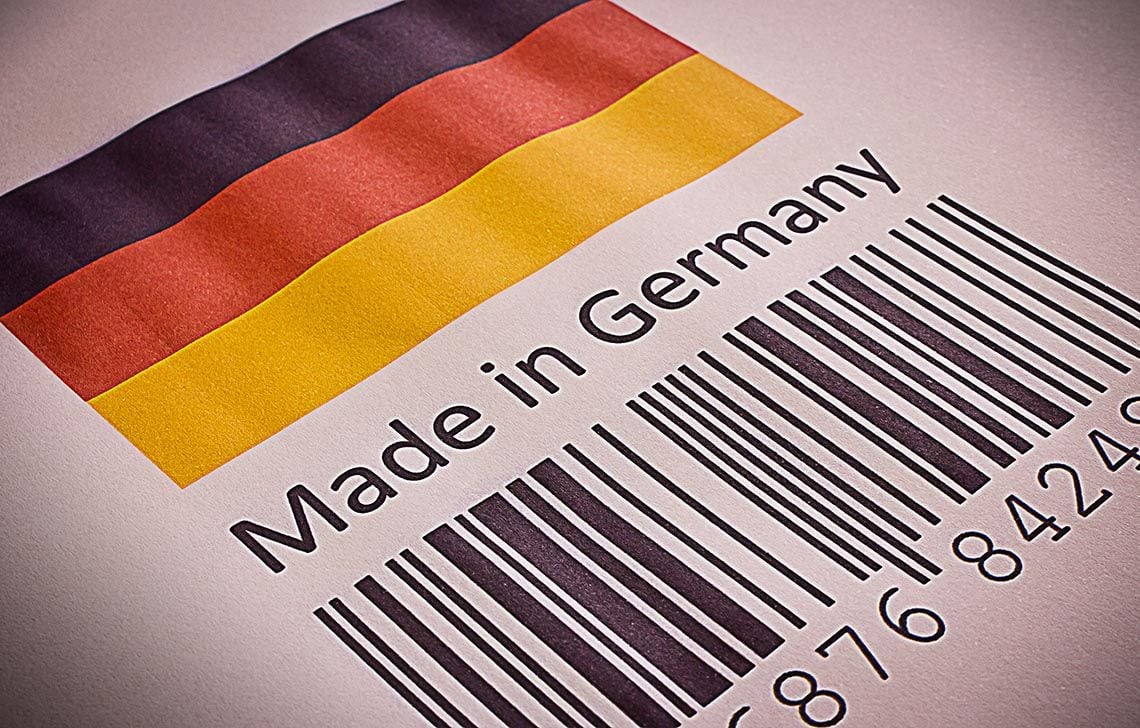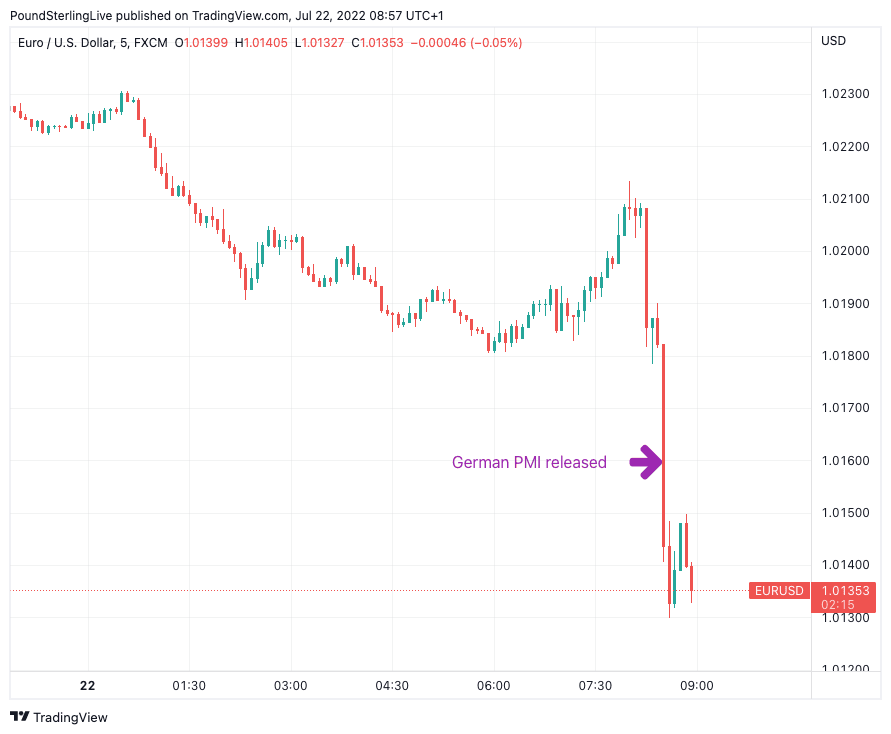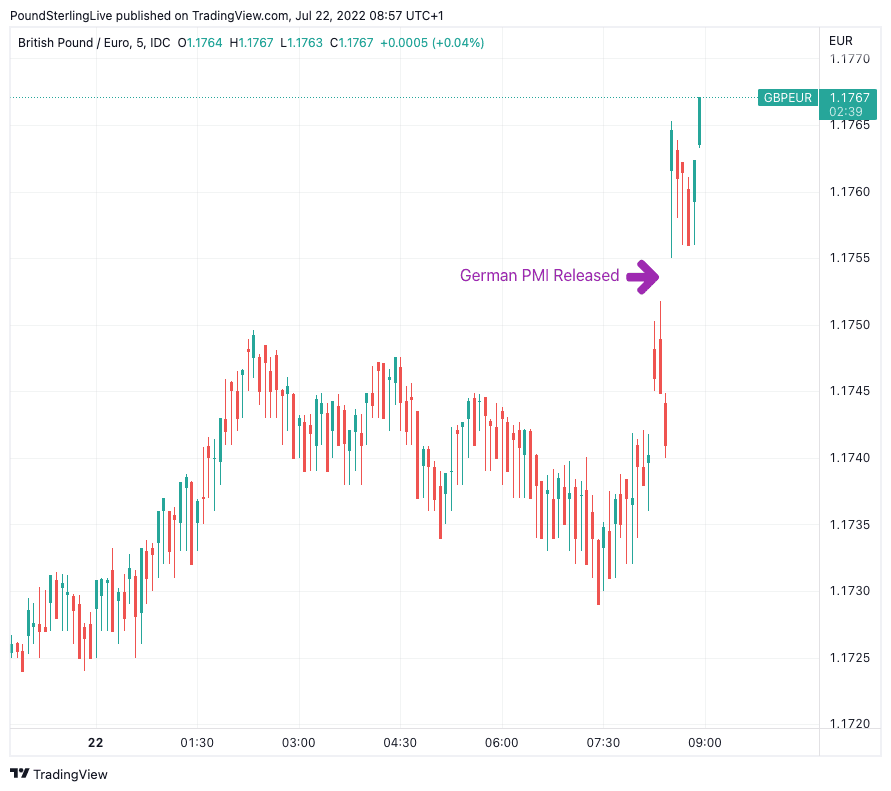Euro Hit by Plunging German, French PMIs
- Written by: Gary Howes

Image © Adobe Stock
The Euro was sold on the release of German PMI data for July, which confirmed a sharper than expected economic slowdown is underway on the continent.
The sell-off was sustained when data for the Eurozone was released 30 minutes later and confirmed a rapid cooling in activity, casting doubt on how many more interest rates were likely to come out of the European Central Bank over coming months.
The German Manufacturing PMI for July from S&P Global read at 49.2 in July, down from 52.0 in June, which places Germany's all-important manufacturing industry in contractionary territory as a reading below 50 marks contraction.
The market was looking for expansion at 50.6.
The Euro to Dollar exchange rate promptly dropped on the data release:
Above: EUR/USD at five minute intervals.
"The euro heads lower again this morning as European purchasing manager indices point to contraction for both manufacturing and services across the bloc," says Neil Wilson, Chief Market Analyst at Markets.com. "The euro has erased all the gains made after yesterday’s jump on the European Central Bank decision to raise rates."
Germany's services sector also contracted according to the PMI report with the Services PMI reading at 49.2, below the 51.2 expected by the market and the 52.4 recorded in June.
The Composite PMI - which readjusts these readings to give a more accurate guidance on the broader economy - read at 49.2, where 50.6 was expected and 52.0 was recorded in June.
The Pound to Euro exchange rate rose in the wake of the data release:
Above: GBP/EUR at five minute intervals.
S&P Global said the slowdown in German activity came on the back of declines in both domestic and export demand was indicated by the latest data as a combination of an uncertain business environment, supply shortages and stretched client budgets weighed on the sector.
French PMI data was meanwhile released 15 minutes ahead of the German figures, and the results were equally disappointing:
The French Manufacturing PMI for July read at 49.6, down on June's 51.4 and below consensus expectations for 50.8. The Services PMI did however show expansion at 52.1, but this was still below expectation (52.7) and June (53.9).
The French Composite PMI was at 50.6, versus expected (51.8) and June (52.5).
The Eurozone Composite PMI reflected the disappointing numbers out of France and Germany with Manufacturing slipping to 49.6 in July from 52.1 in June and disappointing against the 51.0 forecast.
Compare Currency Exchange Rates
Find out how much you could save on your international transfer
Estimated saving compared to high street banks:
£2,500.00
Free • No obligation • Takes 2 minutes
Eurozone Services PMI read at 50.6 against 52.0 expected and 53.0 previously. The Composite figure read at 49.4 against 51.0 expected and 52.0 in June.
S&P Global said concerns over the weakening of demand were exacerbated by energy, supply and inflation worries to push Eurozone business expectations lower, and also cause a steep drop in input buying and a pull-back in hiring.
The data suggests a sharp slowdown is underway and jars with European Central Bank Christine Lagarde's view that an Eurozone recession remains unlikely.
Lagarde's comments were made the day prior as she announced the ECB was hiking interest rates by 50 basis points.
But the ECB also stressed further interest rate hikes were dependent on what the data do, and given the incoming survey numbers ECB rate hike expectations will inevitably come down.
This readjustment will likely automatically feed into lower Euro exchange rates.
"Bond yields also slipped on these reports indicating slowdown, which could cut short the ECB’s nascent hiking cycle. The ECB missed its chance to do anything meaningful about inflation," says Wilson.
Compare Currency Exchange Rates
Find out how much you could save on your international transfer
Estimated saving compared to high street banks:
£2,500.00
Free • No obligation • Takes 2 minutes






